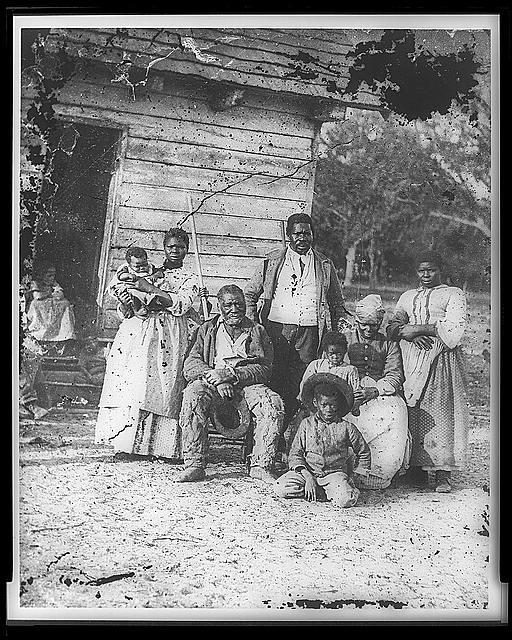Family on Smith's Plantation
Five generations of an African American family on Smith's Plantation in Beaufort, South Carolina. According to George Mason University's History Matters:
This African-American family was photographed in 1862 after Union forces captured the Sea Island coastal area of South Carolina. One of four photographs taken by Timothy O’Sullivan of the J. J. Smith plantation, this picture was subsequently exhibited at Alexander Gardner’s Washington, D.C., photography gallery in September 1863. In contrast to this Beaufort, South Carolina, family the history of the slave family was usually characterized by constant efforts by enslaved African Americans to maintain continuity in the face of forced break-ups and sales (exemplified in the naming of children to mark lineage).

Image:
O'Sullivan, Timothy H. Five generations on Smith's Plantation, Beaufort, South Carolina. 1862. Library of Congress Prints and Photographs Division Washington, D.C. http://www.loc.gov/pictures/item/98504449/
Context:
"Five Generations on Smith's Plantation, Beaufort, South Carolina." History Matters - The U.S. Survey Course on the Web. Accessed June 25, 2019. http://historymatters.gmu.edu/d/6807/.
Public Domain
Public Domain is a copyright term that is often used when talking about copyright for creative works. Under U.S. copyright law, individual items that are in the public domain are items that are no longer protected by copyright law. This means that you do not need to request permission to re-use, re-publish or even change a copy of the item. Items enter the public domain under U.S. copyright law for a number of reasons: the original copyright may have expired; the item was created by the U.S. Federal Government or other governmental entity that views the things it creates as in the public domain; the work was never protected by copyright for some other reason related to how it was produced (for example, it was a speech that wasn't written down or recorded); or the work doesn't have enough originality to make it eligible for copyright protection.
Add a comment
PLEASE NOTE: NCpedia provides the comments feature as a way for viewers to engage with the resources. Comments are not published until reviewed by NCpedia editors at the State Library of NC, and the editors reserve the right to not publish any comment submitted that is considered inappropriate for this resource. NCpedia will not publish personal contact information in comments, questions, or responses. If you would like a reply by email, note that some email servers, such as public school accounts, are blocked from accepting messages from outside email servers or domains. If you prefer not to leave an email address, check back at your NCpedia comment for a reply. Please allow one business day for replies from NCpedia. Complete guidelines are available at https://ncpedia.org/about.